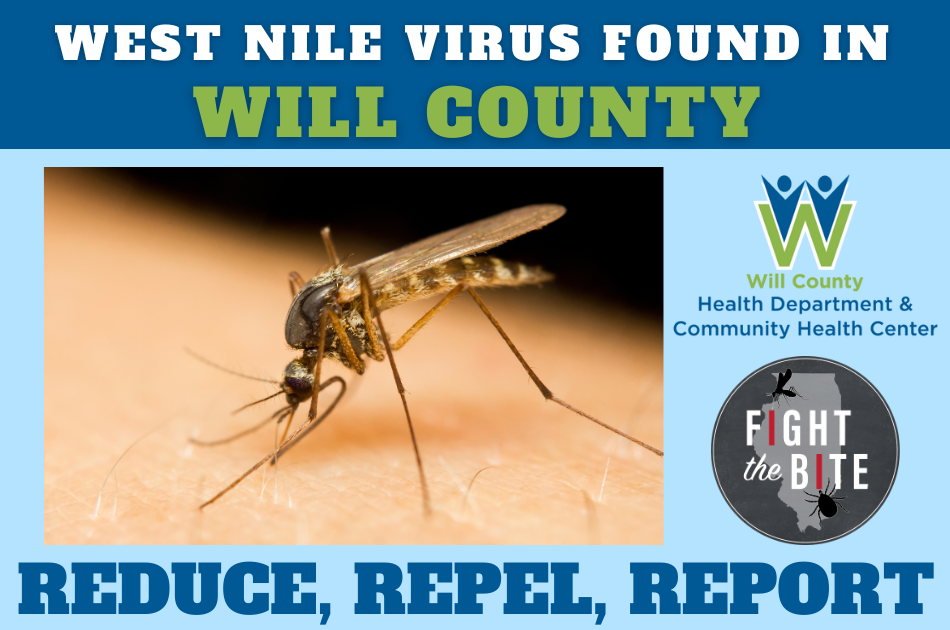First Bird and Additional Cases of Mosquitoes with West Nile Virus Detected in Will County
The Will County Health Department’s Environmental Health division announced that additional batches of mosquitoes and a dead bird have tested positive for West Nile virus [WNV]. Mosquitoes that tested positive for WNV have been found in Joliet, Homer Glen, Shorewood, Lockport, Manhattan, New Lenox, Bolingbrook, Mokena, Frankfort and Plainfield.

No human cases of West Nile virus have been reported so far this year.
“West Nile Virus can lead to serious illness, especially for our Illinois seniors and people with weakened immune systems,” said Illinois Department of Public Health (IDPH) Director Dr. Sameer Vohra. “With the virus appearing earlier this year following a milder winter and spring, I urge everyone to fight the bite in their communities. Please reduce exposures, wear insect repellent while outdoors, and report any standing water around your community where mosquitoes can breed.”
West Nile virus and birds
WNV is transmitted to birds through the bite of an infected mosquito. Mosquitos can also become infected by biting infected birds. According to the Centers for Disease Control and Prevention (CDC), since WNV was discovered in United States in 1999, the virus has been detected in over 300 species of dead birds. Crows, jays and robins are the most common birds to carry WNV.
There is no evidence that a person can get WNV from handling live or dead infected birds. However, avoiding bare-handed contact with any dead animal is always recommended. If you must pick up a dead bird, use gloves, a shovel or an inverted plastic bag to place the bird in a garbage bag.
If you Find a dead bird on your property?
If you find a dead bird on your property, please call the Will County Health Department’s Environmental Health West Nile Surveillance Hotline at 815-740-7631 to determine if the bird can be sent in for testing.
Symptoms of West Nile virus
WNV typically causes mild, flu-like symptoms. According to the CDC, most people [8 out of 10] infected with West Nile virus do not develop any symptoms. About 1 in 5 people who are infected develop a fever with other symptoms such as headache, body aches, joint pains, vomiting, diarrhea, or rash. Most people who develop symptoms from WNV recover completely, but fatigue and weakness can last for weeks or months.
However, according to the CDC, about 1 in 150 people who are infected develop a severe illness that affects the central nervous system such as inflammation of the brain (encephalitis) or inflammation of the membranes that surround the brain and spinal cord [meningitis). Severe illness can occur in people of any age, however people over 60 years of age are at greater risk for severe illness if they are infected. People with certain medical conditions, such as cancer, diabetes, hypertension, kidney disease, and people who have received organ transplants, are also at greater risk.
Preventing West Nile Virus
Because there is no vaccine available to prevent West Nile virus, it is important to avoid mosquito bites.
IDPH encourages the public to Fight the Bite by practicing the three “R’s” – reduce, repel, and report:
• REDUCE – make sure doors and windows have tight-fitting screens. Repair or replace screens that have tears or other openings. Try to keep doors and windows shut. Eliminate, or refresh each week, all sources of standing water where mosquitoes can breed, including water in bird baths, ponds, flowerpots, wading pools, old tires, and any other containers.
• REPEL – when outdoors, wear shoes and socks, long pants and a light-colored, long-sleeved shirt, and apply an EPA-registered insect repellent that contains DEET, picaridin, oil of lemon eucalyptus, or IR 3535 according to label instructions. Consult a physician before using repellents on infants.
• REPORT – report locations where you see water sitting stagnant for more than a week such as roadside ditches, flooded yards, and similar locations that may produce mosquitoes. The local health department or city government may be able to add larvicide to the water, which will kill any mosquito larvae.
For More Information
For more information on WNV and what can be done to prevent getting bitten by mosquitoes, visit the Centers for Disease Control and Prevention’s West Nile virus page or at the Illinois Department of Public Health’s West Nile Virus page.
